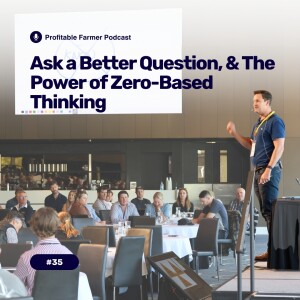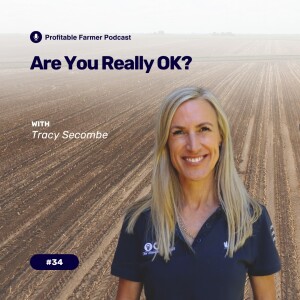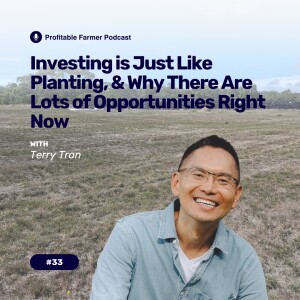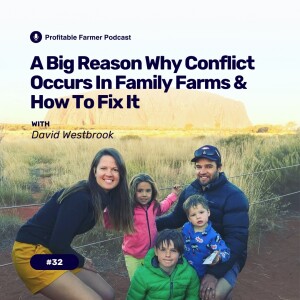Profitable Farmer
This show is all about increasing the profitability of your farm so you work smarter and not harder. Your host, Jeremy Hutchings (Managing Director at Farm Owners Academy), reveals the best farming business tips for more leverage in your farm business.
This show is all about increasing the profitability of your farm so you work smarter and not harder. Your host, Jeremy Hutchings (Managing Director at Farm Owners Academy), reveals the best farming business tips for more leverage in your farm business.
Episodes

Tuesday Sep 17, 2019
# 35 - Ask a better question, and the power of zero-based thinking
Tuesday Sep 17, 2019
Tuesday Sep 17, 2019
It’s really simple. Asking a better question will lead to a better decision.
The problem is, we weren’t taught at school how to ask a great question.
We will help you learn how to do this in today’s podcast.
For example, just asking the simple question every hour or so “Is this the best use of my time?” can help you improve your productivity.
I will open you up to the power of asking better questions AND the impact this can have on your business.
I will share a strategy I learnt from a very successful mentor of mine that saved my business and helped me bring in an additional $150k in revenue (in just one month). It’s called zero-based thinking and I personally believe this is one of the best business strategies I have ever been taught.
Enjoy this month’s podcast and please share this with another farmer.
Take it easy,
Andrew
PS: Super early bird tickets to our TOP Producers 2-Day Workshop are now on sale, offering a crazy saving of $1295! Come along and learn how to run a better farming business.

Tuesday Sep 03, 2019
# 34 - Are you really ok?
Tuesday Sep 03, 2019
Tuesday Sep 03, 2019
RUOK?
The 10th annual RUOK Day takes place on Thursday 12th September 2019.
Farm Owners Academy wholeheartedly supports the RUOK initiative because we recognise the prominence of mental health issues within farming.
In a bid to raise awareness, we are dedicating this episode of the Profitable Farmer podcast to this poignant cause.
Today, I have an in-depth discussion about mental health within the farming community with Tracy Secombe, renowned mindset coach and creator of Soul Pleaser™
For the past 3 years, Tracy has been leading our team of Platinum Mastermind coaches which has given her a unique insight into the personal lives of hundreds of farmers, their struggles, issues and fears.
There is so much wisdom in this interview.
Tracy explains why so many of us ‘people please’, and the impact this has on our mental health.
We also discuss:
Why male farmers carry so much fear of failure and how anxiety is created from losing the farm
How so many people put on a brave face but are actually really suffering at home
Why depression is created by analysing the past, and anxiety is worrying about the future
Why we avoid communicating what we truly want in order to avoid potential conflicts
Why many family-run businesses have issues with communication
The underlying reasons for arguments within families
Why succession planning has become taboo
We hope this podcast resonates with you on some level; or at the very least, encourages you to ask “RUOK?”
Please, share this with another farmer today 🙏🏼
Take it easy,
Andrew
PS - if you would like to connect with Tracy, please click here to email her.

Thursday Aug 15, 2019
Thursday Aug 15, 2019
In this week’s podcast we interview Terry Tran.
Terry shares with us how investing is just like planting a crop and the power of timing.
There’s some great content in this podcast including:
Why now is amazing timing to pick up some stock opportunities
Does Terry believe we are heading for a recession
Terry’s thoughts on the value of land and if he would be trying to buy more farm land right now
Some insight into how he values a business to invest in and what you need to know to invest.
Take it easy,
Andrew
PS: if you are interested in registering for a free online training coming up with Terry, please click here.
P.P.S Whenever you’re ready…here are 3 ways we can help you grow your farming business:
1. The founders of FOA run a special free online training to show you how to create a profitable business that has the ability to work without you (creating a freedom farm) – Click here to register for the next one.
2. Join the Farm Owner Academy’s closed Facebook group ‘Profitable Farmer’ Our new Facebook community is where smart farm owners learn how to get more profit, control and freedom, and you can connect with like-minded farm owners – click here to join.
3. Subscribe to our ‘Profitable Farmer’ podcast This free audio podcast delivers ideas to help you run a great business – leading to more profit, control and freedom – click here.

Tuesday Jul 30, 2019
# 32 - A big reason why conflict occurs in family farms and how to fix it.
Tuesday Jul 30, 2019
Tuesday Jul 30, 2019
Are you frustrated because your vision for the farm is different to other family members and you can’t agree on the way forward?
In this podcast, David Westbrook and I discuss one of the BIGGEST issues affecting family farms.
Disagreements between generations, parents and/or siblings is a real issue and an unbelievably common occurrence in the farming sector.
In this episode we explore the importance of core values and how to get everyone on the same page.
Here are some of the things we discuss:
Different generations wanting different things from the farm.
Why having written core values will give you more direction, clarity and motivation.
Why understanding others values will improve relationships.
Why judging and feeling judged is down to a lack of awareness.
We want to help you work through these issues and enable you to live the farm life that you all want… because why would you allow someone else to dictate your future?
We hope this podcast answers some questions and helps you encourage every member of your family to work towards a common goal.
After this you’re going to have the best family Christmas ever!!
We hope you find this episode valuable. Feel free to head over to the Profitable Farmer Podcast page to tell us what you think.
Regards,
Andrew

Tuesday Jul 16, 2019
# 31 - Could your money beliefs be holding you back
Tuesday Jul 16, 2019
Tuesday Jul 16, 2019
Do you think that you might have a negative association to money?
If you get stressed, angry or you find yourself complaining about money, you might be surprised to hear you could have a limiting belief around it.
We address this in this week’s podcast and you can listen by clicking here.
Here is a list of some common limiting beliefs:
Money is hard to make
Money comes in one hand and out the other
Money is difficult to make, particularly as a farmer
Money is scarce and hard to come by
Money doesn’t grow on trees
There is not enough money to go around
I don’t have enough for later on in my life
Paying for my kids’ education is expensive
Many of these beliefs were created when you were a child and were most likely passed onto you by your parents, your community and even your teachers.
It’s very hard to get ahead and go for what you want when you carry these beliefs.
In today’s episode, we explore these limiting beliefs and what you can do to remove them.
It’s a really important podcast and we hope you enjoy it.
Andrew

Sunday Jun 30, 2019
# 30 - If you chase two rabbits, you will catch neither.
Sunday Jun 30, 2019
Sunday Jun 30, 2019
Do you ever get distracted?
Do you often have ideas but sometimes lack the ability to implement or see them through to completion?
Do you feel crystal clear on where you are going and how to get there?
Today’s podcast ‘If you chase two rabbits, you will catch neither’ will help you focus on less, and simplify how you run your business.
Andrew will open you up to:
The Entrepreneurs Curse and why you need to be aware of this;
Magnifying Glass Theory and how you can use this to explode your business growth;
The power of FOCUS and how it will help you profit more whilst working less;
Discipline to not get caught up in ideas;
Why breaking your goals into 90 days is such a powerful thing to do.
Enjoy the podcast.
FOA

Saturday Jun 15, 2019
# 29 - How the Vacuum law can be used to create prosperity in your life
Saturday Jun 15, 2019
Saturday Jun 15, 2019
Today we discuss how The Vacuum Law can be used to create prosperity in your life.
The Law of the Vacuum is a universal law and is one of the main reasons why you may always feel busy and never have time do to the things you want.
It could also be the reason why you feel you don’t get ahead as quickly as you would like to.
Andrew will share with you how this effect:
Money;
Time;
Health;
Relationship.
….and most importantly, how to change this!
Enjoy this free podcast.
Regards,
FOA

Tuesday May 21, 2019
Tuesday May 21, 2019
One of our clients, David Westbrook, shared an article that he’d written recently.
It really inspired me, so I decided to interview him for this month’s podcast.
David has agreed for me to share his article with you:
What advice would I give to an up and coming farmer?
Simple... just smile more.
We worry about everything and this creates resistance to what we truly want.
We need to read, we need to journal, we need to get educated on our core focus and we need to implement, but if we just smile every now and then.... we will get there so much quicker and happier.
We worry about the rain, we worry about the markets, we worry about what others think of us.
Where does this worry get us? Nowhere, in fact it makes us go backwards.
We do our due-diligence on the markets, we have a risk mitigation strategy for a drought, and you know what? Other people aren’t even thinking about us anyway. Do you know why? Because they’re too busy worrying about what you think of them!
We spend so much time in fear of these things happening. We are continuously telling ourselves “what if I stuff this up” but just imagine if you said “what if I nail this”?
Remember when you were a kid?... Before school and all the expectations on you and your future? You just played and life was a game.
Why do we change from that childlike mindset? That child isn’t thinking about all the ‘what ifs’ that are irrelevant to the current moment. They’re living in the now, having fun…
So just smile. If you f**k up, learn the lesson and don’t take life so bloody serious.
Just have fun.
- David Westbrook
I know you will get a lot from hearing this.
If you know a farmer that would also benefit from this, please share it with them.
Many Thanks,
Andrew

Tuesday May 14, 2019
# 27 - The three main reasons farmers make world class investors
Tuesday May 14, 2019
Tuesday May 14, 2019
Being an entrepreneurial farmer today can be tough.
There seems to be more work and less time to get things done...and you need to devote even more energy into running your business than ever before.
And despite all that...most farmers are barely getting by financially. They still worry about:
How they’ll make it through the current season
Whether they’ll lose the farm that’s been in their family for generations, and
If they’ll be able to retire, of they’ll have to keep working until they’re 99 to pay the bills
That’s why I want you invite you to a free podcast interview called ‘The three main reasons farmers make world class investors’, where I had an honest chat about money and “getting ahead” with my friend and investment mentor, Terry Tran. (He’s the guy on the right in the photo below.)
Terry’s the best guy I know when it comes to money advice. His system is simple but genius: minimise risk to maximise profits.
Terry’s all about protecting yourself FIRST, eliminating the normal risks associated with the stock market, so that you’re only choosing from the safest, securest, most “sure thing” stocks.
And he makes it all so easy to understand...
I don’t know about you, but I can find stock market talk overwhelming. Dividends, position sizing, shorts...all of it makes my head spin.
But Terry talks in plain English. He takes the complexities of the stock market and breaks it down so normal people like you and me can actually understand it!
In this environment — as crazy and hectic as it can be sometimes — there’s more opportunity than ever for financial freedom. You've just got to know where to look.
I know you're gonna love this special podcast because it's jam-packed with ideas, inspiration, and guidance about how you can create real wealth off the farm through investing safely.
I already know it’s going to be one of our most popular podcasts (just like his last was)!
On the episode, you’ll also hear us talk about Terry’s upcoming FREE LIVE online training exclusive for our farm owners community called ‘How to Create Real Wealth Outside Your Farm Without Taking Silly Risks’. It’s the perfect next step if you want to learn the steps to create a consistent income stream that’s not dependent on the farm.
Cheers, Andrew

Friday Apr 26, 2019
# 26 - How to hire a GUN worker
Friday Apr 26, 2019
Friday Apr 26, 2019
G’day,
In this week’s episode, Andrew walks you through the steps to hire a GUN worker.
Here are some of the things that you will learn:
One good person will beat three average
Hire slowly, fire fast
Don’t just look local
Start with the job ad
Hire more on traits than skills
Listen to hear the rest!
If you need help when it comes to finding and hiring strong team members, this podcast is for you!
Feel free to share this with any other farmers that could use these tips!
Cheers
FOA







